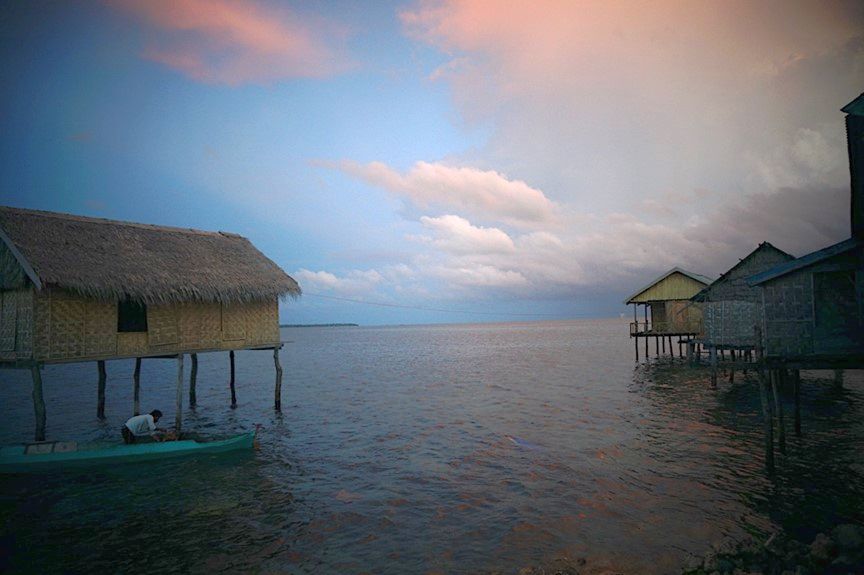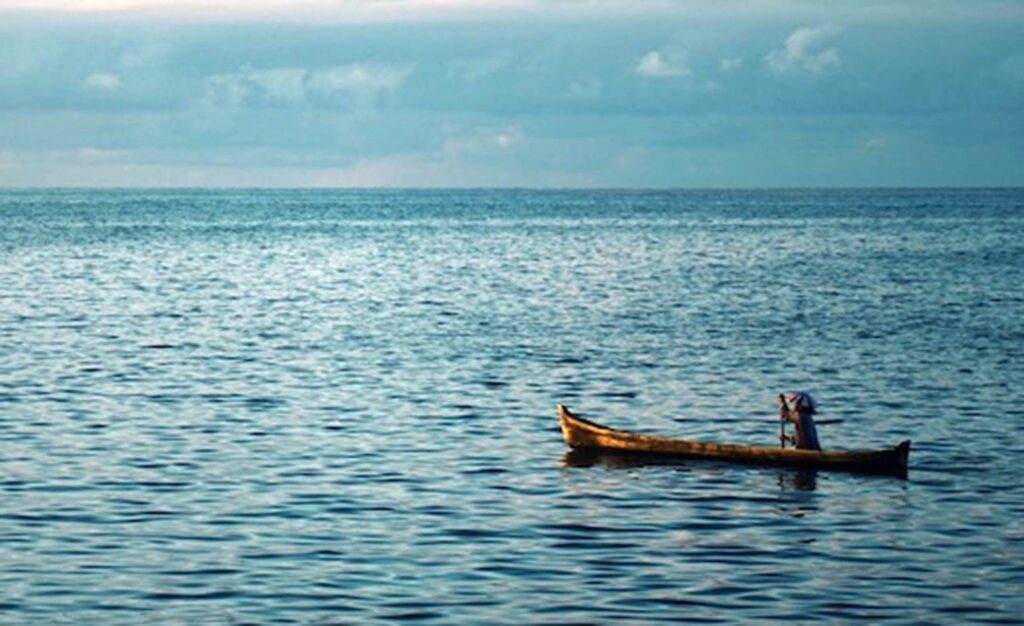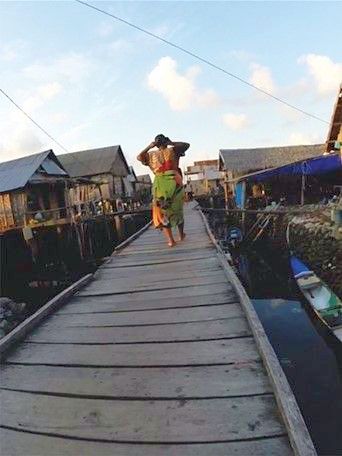It’s 6am and I wake up to the rhythmic sound of waves lapping on the mangrove beams supporting this stilt house. I have rented this home from a family who have temporarily migrated for work. I am in a community officially called Sama Bahari, known locally as Sampela. This community stands completely above the sea and is about one kilometer away from the nearest island here in the Wakatobi National Park, Southeast Sulawesi, Indonesia.

The waters are calm. I can hear people paddling out to sea. Many have already started their day of fishing. I hear my friendly neighbour Putri* shout from the walkway that connects most of the houses in the village: “Melody! I have bread! I have cakes!” Barely awake, I make my way outside to purchase some freshly baked goods for breakfast.
I head back inside and start boiling some water for coffee. I paddled two kilometers yesterday to reach the nearest market for fresh water, since there is no running water in the village. The small kerosene stove I’m using is from a market even further away that has a greater selection of goods. Many of the local people here do not cook using kerosene because it is too expensive. Instead, they use mangroves—coastal trees—as cooking fuel.
However, cutting down mangroves is illegal here. We are in a marine protected area, and mangrove forests are ecologically important coastal ecosystems. Local people know they are not supposed to cut the mangroves, but they cannot afford to purchase alternatives.
Who are the locals? They belong to the Sama-Bajau ethnic group, who are known for being traditionally nomadic fishers. Their culture is heavily centered around their relationship with the marine environment. In Sama-Bajau tradition, the natural environment is not separate from humanity, but closely intertwined both physically and spiritually.
While a minority population, Sama-Bajau comprise the largest group of fishers in the area. However, when the National Park was established in 1996, Sama-Bajau were not meaningfully consulted. Park management positions are not filled by Sama-Bajau, rather by people from nearby or even distant islands, who belong to different ethnic groups and are generally of higher socio-economic status. These class and ethnic frictions underlie conservation efforts here in the Park.
Many Park policies disregard Sama-Bajau livelihood and cultural needs. Some of the closest reefs are now off limits for fishing (no-take zones), meaning fishers need to spend more time and money reaching farther areas. Some species are no longer allowed to be fished. Corals, which like mangroves are used as a building material, are also restricted.
Unfortunately, there are destructive fishing methods that are sometimes used in the Park, including blast fishing—where dynamite is thrown into a specific area, killing targeted and non-targeted species—or the use of cyanide to stun species, which also damages the marine environment.
The Park rangers have difficulty accessing information about destructive fishing and other illegal resource use within the Park. Indeed, because conservation interferes with their daily lives, many Sama-Bajau refuse to share information with Park officials. Utari, a 65-year-old woman, explained:
“I met the Park rangers once when I was gleaning. They wanted to know where people were using cyanide. I didn’t tell them. I don’t want people to use cyanide either, but I don’t like the rangers. We can’t take anything in the sea; they always tell us not to.”
Park policies don’t impact everyone equally. For instance, women and men use and access marine resources in distinct ways. To illustrate, cutting down mangroves here is seen as ‘women’s work’. Indeed, many livelihood activities that are traditionally understood as women’s tasks have been made illegal due to Park policies. Wati, an older woman, passionately explained:
“I hate the rangers. I’m a widow and I mine coral and I cut mangroves because those are the jobs for me, but the rangers protect the coral and the mangroves!”
Fishing and income-earning activities in general are often considered ‘men’s work’. Such norms are clearly revealed in a response from Yuda, a 44-year-old net fisherman, who stated: “I restrict my wife from going fishing and finding money because it is my responsibility.”
I am thinking about these gender dynamics in the village as I eat my breakfast, because the cakes that I bought from my neighbour this morning also reveal such dynamics. One of the other bakers in the village does not go door-to-door, unlike my neighbour Putri. She explained:
“I sell cakes, but only from my house, so my husband is okay with it. If I tour around the village with my cakes, my husband would restrict me because he’d be embarrassed. He doesn’t like me asking people to buy my cakes because it looks desperate. If I stay inside the house, it’s okay. It’s a pride issue. If I’ve got a problem with family finances, I go around anyway and sell cakes. I try to explain that to my husband or, when he’s not home, I’ll go around the village and sell cakes anyway.”
Many men in the village are proud to be the household breadwinners. For instance, Agung, a burly middle-aged fisher explained the pressure he feels to meet local gender expectations:
“I am shy to borrow money from my friends, even from my family. [My friends would say:] ‘You are a big guy with big muscles. If you don’t work, what is your body used for?”’
However, some men from the younger generation, particularly those with more years of formal education, acknowledge the benefits of having a second income-earner in their household. Therefore, it is not only ethnicity and class, but also gender and generation underlying livelihood activities and resource use within the Park.

As I finish my coffee, I head outside to meet some friends. I am learning to weave using pandan leaves. We gather on the walkways connecting our houses. Just over a decade ago, many houses in this community were disconnected, accessed only by canoe. When houses were disconnected, community information was mainly shared through men’s fishing networks, while women remained in the house for much of the day. These walkways now facilitate easy travel throughout the village and provide a common space for socializing, exchanging information, sharing equipment and trading. The walkways have also allowed women to build new social networks independent of their husbands, with women gaining important information when deciding to pursue paid livelihood activities, such as the price of goods or how to complete certain tasks. Similarly, walkways allow Sama-Bajau women to establish a reliable network to support their paid activities, for example by developing closer relationships with people from whom they might borrow a canoe or source fish for trade. The result is as Indah, a young, divorced mother, stated: “women are becoming more independent, just like men.”

Local Sama-Bajau do not passively accept the conservation regulations imposed upon their communities. Instead, they continue to access marine and coastal resources for their culture and livelihoods in ways that they consider to be morally fair. Despite much ‘women’s work’ being made illegal by the protected area, and social stigmatization along lines of gender, class, ethnicity and culture, women in Sama Bahari are important providers of forbidden resources and contributors to household livelihoods. In all, these dynamics demonstrate the need for conservation work to place gender, ethnicity, culture, and class centrally in analyses and interpretations.
This story is based on the research published in Gender, Place & Culture, referenced below.
*All names in this story are pseudonyms.
Reference
Lynch, Melody and Turner, Sarah (2021). Rocking the boat: intersectional resistance to marine conservation policies in Wakatobi National Park, Indonesia. Gender, Place & Culture. DOI: 10.1080/0966369X.2021.1971630.
About the authors
Melody Lynch is PhD Candidate in the Department of Geography at McGill University in Montreal, Canada. Melody primarily works in rural and urban Indonesia and Malaysia, looking at the implications of conservation and development policies across lines of gender, generation, ethnicity, and class. You can learn more about her research by visiting her website: www.melodylynch.ca.
Professor Sarah Turner is a development geographer and Professor in the Department of Geography, McGill University, Montréal, Canada. Her research focuses broadly on everyday livelihoods in Asia, with particular emphasis on ethnic minorities in the Southeast Asian Massif, especially northern Vietnam and southwest China, with previous research in South Sulawesi, Indonesia. Her research interests span agrarian change, everyday politics and resistance, minority livelihoods, and informal economies. She is co-author with C. Bonnin and J. Michaud of Frontier Livelihoods. Hmong in the Sino-Vietnamese Borderlands (2015, University of Washington Press), and one of the editors of Geoforum.
This entry was posted in: Asia, Fisheries, Indonesia, Men, Women
